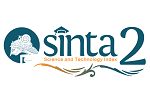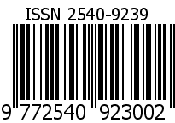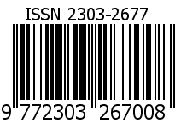Health Information literacy among children at Reading Communities in Sumedang Regency
Abstract
Children are susceptible to disease due to unhealthy lifestyle habits. Hence, children need correct health information for healthy living behavior. The Reading Community (RC), as a repository and manager of knowledge, has health information services for children. Three Reading Communities (RCs) in Sumedang Regency provide health-themed books and provide health-themed literacy activities. This study aimed to determine health information literacy in children at Reading Communities in Sumedang Regency. This study used a qualitative descriptive method and was conducted at three (3) Reading Communities in Sumedang Regency, including Lingkaran Cahaya RC, Bina Kreasi Muda RC, and Pabukon Ngadongeng RC. Study results showed that children from RCs already knew the need for health information; however, they did not know the correct process for implementing it. The three RCs had various health readings, such as books, comics, and magazines. In addition, they had different strategies for planning health information for children, and they held activities according to the competencies or interests of the users. Three RCs collected health information from reading and activity-based collaboration had reading comprehension activities as an evaluation process in health information literacy and conducted reviews of activities or discussions from reading results in the form of read-aloud and think-aloud. Two RCs stored information in master books and catalogs and promoted health information activities using social media. Despite limitations in providing access to health information, the three Reading Communities have innovations in health information practices in the form of literacy activities.
Keywords
Full Text:
PDFReferences
Abdel-Wahab, N., Rai, D., Siddhanamatha, H., Dodeja, A., Suarez-Almazor, M. E., & Lopez-Olivo, M. A. (2019). A comprehensive scoping review to identify standards for the development of health information resources on the internet. PLOS ONE, 14(6), 1–16. https://doi.org/10.1371/journal.pone.0218342
Abdoh, E. (2022). Online health information seeking and digital health literacy among information and learning resources undergraduate students. The Journal of Academic Librarianship, 48(6), 1–9. https://doi.org/10.1016/j.acalib.2022.102603
Backes, L., Felicetti, V. L., & Almeida, F. A. P. de. (2024). Storytelling: Recontextualizing language in literacy for student learning. Signo, 49(96), 137–151. https://doi.org/10.17058/signo.v49i96.19387
Baggett, K., Connell, V., & Thome, A. (2018). Frame by frame: Using the ACRL Framework for Information Literacy to create a library assessment plan. College & Research Libraries News, 79(4), 186–200. https://doi.org/10.5860/crln.79.4.186
Bernard, D., Bobish, G., Hecker, D., Holden, I., Hosier, A., Jacobson, T., ... & Bullis, D. (2014). The information literacy user’s guide. Open SUNY Textbooks. https://libraries.idaho.gov/files/The-Information-Literacy-Users-Guide-pdf (2).pdf
Bolek, V., Kokles, M., Romanová, A., & Zelina, M. (2018). Information literacy of managers: Models and factors. Journal of Business Economics and Management, 19(5), 722–741. https://doi.org/10.3846/jbem.2018.6906
Dida, S., Lusiana, E., Dewi, R., Yuliani, R., & Muslimin, F. A. (2022). Komik sebagai media sosialisasi protokol kesehatan untuk persiapan pembelajaran tatap muka di Kabupaten Sumedang. Dharmakarya: Jurnal Aplikasi Ipteks Untuk Masyarakat, 11(2), 120–127. https://jurnal.unpad.ac.id/dharmakarya/article/view/35630/21068
Elhassaneen, Y., & Sayed, R. (2015). Chemical and toxicological evaluation of some snacks consumed by children in Egypt. International Journal of Nutrition and Food Sciences, 4(4), 1–10. https://doi.org/10.11648/j.ijnfs.20150404.22
Gao, H., & Kohnen, A. (2023). Transnational Chinese students’ online information literacies during the COVID-19 pandemic. Journal of Information Literacy, 17(1), 6–28. https://doi.org/10.11645/17.1.3281
Gessner, A. G. C., & Eldermire, E. (2015). Laying the groundwork for information literacy at a research university. Performance Measurement and Metrics, 16(1), 4–17. https://doi.org/10.1108/PMM-12-2014-0044
Halder, S. N., Tiwari, V. R., & Ali, S. (2024). Exploring health knowledge: An extensive review of information-seeking behaviors, health literacy, and the relevance of libraries and community resources. IP Indian Journal of Library Science and Information Technology, 9(1), 4–11. https://doi.org/10.18231/j.ijlsit.2024.002
Hall, S., & Liebenberg, L. (2024). Qualitative description as an introductory method to qualitative research for master’s-level students and research trainees. International Journal of Qualitative Methods, 23(1), 1–5. https://doi.org/10.1177/16094069241242264
Harisanty, D., Sugihartati, R., Srimulyo, K., & Anwar, N. (2024). The positions of libraries on social media. Cogent Social Sciences, 10(1), 1–14. https://doi.org/10.1080/23311886.2023.2287117
Haryanto, B. (2020). Indonesia: country report on children’s environmental health. Reviews on Environmental Health, 35(1), 41–48. https://doi.org/10.1515/reveh-2019-0088
Harzheim, L., Lorke, M., Rostamzadeh, A., Jessen, F., Woopen, C., & Jünger, S. (2023). The promotion of health literacy. GeroPsych, 36(4), 215–226. https://doi.org/10.1024/1662-9647/a000310
Joseph, R., Fernandes, S., Hyers, L., & O’Brien, K. (2016). Health literacy: A cross-disciplinary study in American undergraduate college students. Journal of Information Literacy, 10(2), 26–39. https://doi.org/10.11645/10.2.2103
Miles, M. B., & Huberman, A. M. (2014). Qualitative data analysis: A method sources book (3rd ed.). SAGE Publications, Inc.
Mohamed, H., Salsberg, J., & Kelly, D. (2023). An integrative review protocol on interventions to improve users’ ability to identify trustworthy online health information. PLOS ONE, 18(4), 1–9. https://doi.org/10.1371/journal.pone.0284028
Multas, A.-M. (2024). Navigating constant change: Exploring information literacies in the context of social media health information. Journal of Information Literacy, 18(1), 110–117. https://doi.org/10.11645/18.1.576
Undang-Undang Republik Indonesia Nomor 43 Tahun 2007 Tentang Perpustakaan. (2007). Lembaran Negara Republik Indonesia Tahun 2007 Nomor 129. Jakarta. Retrieved from http://www.bpkp.go.id/uu/filedownload/2/36/176.bpkp.
Rachmawati, T. S., & Agustine, M. (2021). Keterampilan literasi informasi sebagai upaya pencegahan hoaks mengenai informasi kesehatan di media sosial. Jurnal Kajian Informasi & Perpustakaan, 9(1), 99–114. https://doi.org/10.24198/jkip.v9i1.28650
Rowlands, G., Shaw, A., Jaswal, S., Smith, S., & Harpham, T. (2015). Health literacy and the social determinants of health: A Qualitative model from adult learners. Health Promotion International, 32(1), 130–138. https://doi.org/10.1093/heapro/dav093
Sharun, S. (2019). Exploring value as a dimension of professional information literacy. Journal of Information Literacy, 13(2), 26–40. https://doi.org/10.11645/13.2.2627
Stordy, P. (2015). Taxonomy of literacies. Journal of Documentation, 71(3), 456–476. https://doi.org/10.1108/JD-10-2013-0128
Tringali, B. (2021). Health promotion, collaboration, and outreach: Creating space for health literacy at a specialized, academic research library. Journal of Library Outreach and Engagement, 1(2), 14–21. https://doi.org/10.21900/j.jloe.v1i2.805
Wilson, G., & Hutchison, J. S. (2024). In pursuit of a person-centered approach to care delivery: A qualitative descriptive study of the patient experience of a long-term conditions clinic in general practice. Qualitative Health Research, 34(11), 1–15. https://doi.org/10.1177/10497323241272003
Zhao, X., Ding, S., & Zuo, L. (2022). Evaluation of health information literacy of rural community residents based on intuitionistic fuzzy set multicriteria. Mathematical Problems in Engineering, 1(1), 1–9. https://doi.org/10.1155/2022/8232766
DOI: https://doi.org/10.24198/jkip.v12i2.55101
Refbacks
- There are currently no refbacks.
Copyright (c) 2024 Author(s)

This work is licensed under a Creative Commons Attribution-ShareAlike 4.0 International License.
Jurnal Kajian Informasi & Perpustakaan Indexed by:
Jurnal Kajian Informasi & Perpustakaan
Program Studi Perpustakaan dan Sains Informasi d.h. Program Studi Ilmu Perpustakaan
Fakultas Ilmu Komunikasi, Universitas Padjadjaran
Jl. Raya Bandung-Sumedang Km. 21 Jatinangor, Sumedang, Indonesia 45363
WA: +62 877-1860-4022 (Risa Nurisani)
Telepon: +62227796954
Faksimile: +62227794122
email: jkip.fikom@unpad.ac.id
Jurnal Kajian Informasi & Perpustakaan is licensed under a Creative Commons Attribution-ShareAlike 4.0 International License
Jurnal Kajian Informasi & Perpustakaan supervised by:












2.png)
.png)



